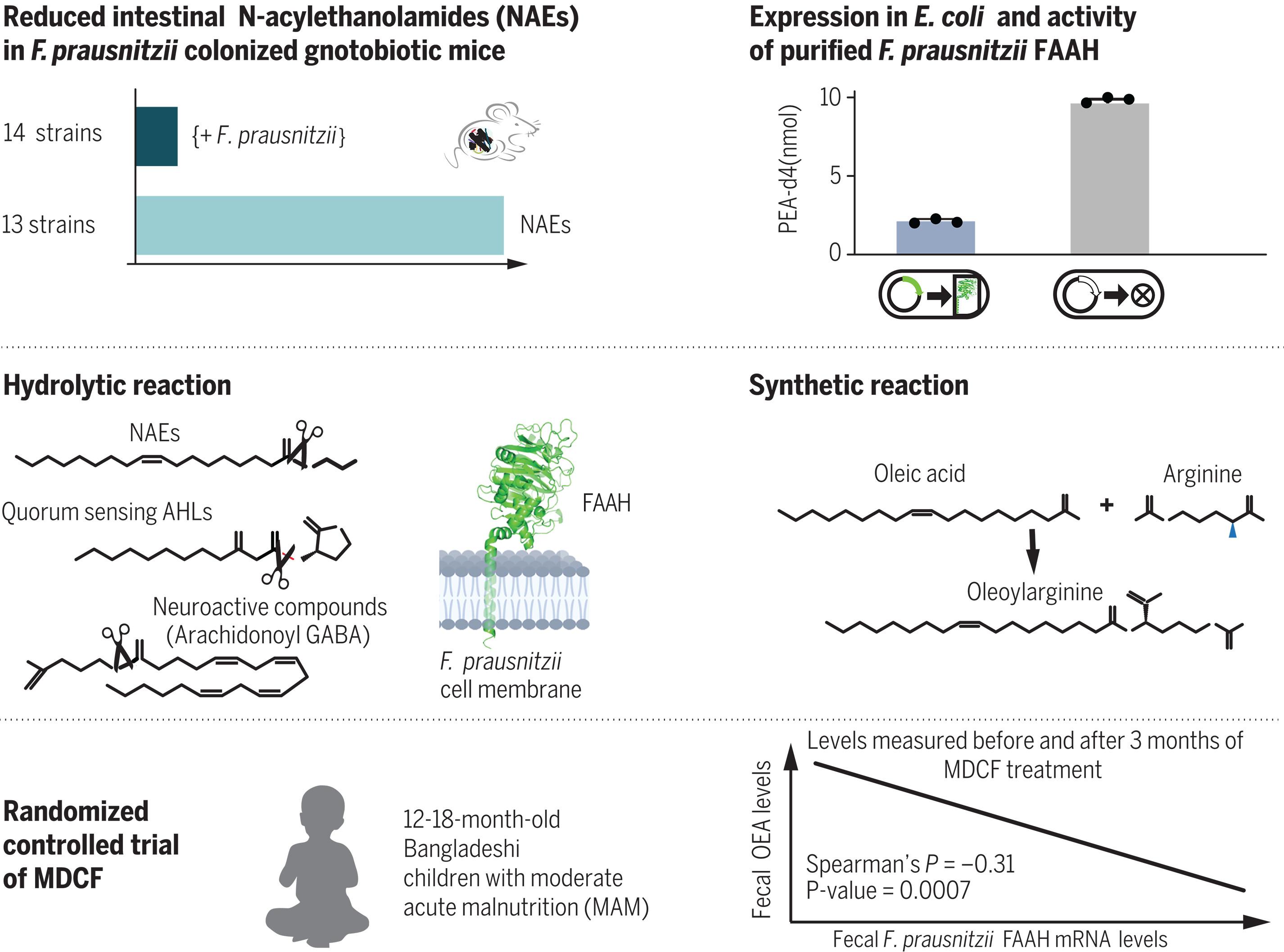A human gut Faecalibacterium prausnitzii fatty acid amide hydrolase
IF 44.7
1区 综合性期刊
Q1 MULTIDISCIPLINARY SCIENCES
引用次数: 0
Abstract
Undernutrition in Bangladeshi children is associated with disruption of postnatal gut microbiota assembly; compared with standard therapy, a microbiota-directed complementary food (MDCF) substantially improved their ponderal and linear growth. Here, we characterize a fatty acid amide hydrolase (FAAH) from a growth-associated intestinal strain of Faecalibacterium prausnitzii cultured from these children. This enzyme, expressed and purified from Escherichia coli, hydrolyzes a variety of N-acylamides, including oleoylethanolamide (OEA), neurotransmitters, and quorum sensing N-acyl homoserine lactones; it also synthesizes a range of N-acylamides, notably N-acyl amino acids. Treating germ-free mice with N-oleoylarginine and N-oleolyhistidine, major products of FAAH OEA metabolism, markedly affected expression of intestinal immune function pathways. Administering MDCF to Bangladeshi children considerably reduced fecal OEA, a satiety factor whose levels were negatively correlated with abundance and expression of their F. prausnitzii FAAH. This enzyme, structurally and catalytically distinct from mammalian FAAH, is positioned to regulate levels of a variety of bioactive molecules.

一种人体肠道普氏粪杆菌脂肪酸酰胺水解酶。
孟加拉儿童的营养不良与出生后肠道微生物群组合的破坏有关;与标准疗法相比,微生物群指导的辅食(MDCF)大大改善了他们的深思和线性生长。在此,我们对从这些儿童体内培养出的与生长相关的普氏粪杆菌肠道菌株中提取的脂肪酸酰胺水解酶(FAAH)进行了鉴定。这种从大肠杆菌中表达和纯化的酶可水解多种 N-酰酰胺,包括油酰乙醇酰胺(OEA)、神经递质和定量感应 N-酰基均丝氨酸内酯;它还能合成一系列 N-酰酰胺,特别是 N-酰基氨基酸。用 FAAH OEA 代谢的主要产物 N-oleoylarginine 和 N-oleolyhistidine 处理无菌小鼠,会明显影响肠道免疫功能途径的表达。给孟加拉国儿童施用 MDCF 会大大减少粪便中的 OEA,而 OEA 是一种饱腹感因子,其水平与 F. prausnitzii FAAH 的丰度和表达呈负相关。这种酶在结构上和催化上都不同于哺乳动物的 FAAH,其作用是调节各种生物活性分子的水平。
本文章由计算机程序翻译,如有差异,请以英文原文为准。
求助全文
约1分钟内获得全文
求助全文
来源期刊

Science
综合性期刊-综合性期刊
CiteScore
61.10
自引率
0.90%
发文量
0
审稿时长
2.1 months
期刊介绍:
Science is a leading outlet for scientific news, commentary, and cutting-edge research. Through its print and online incarnations, Science reaches an estimated worldwide readership of more than one million. Science’s authorship is global too, and its articles consistently rank among the world's most cited research.
Science serves as a forum for discussion of important issues related to the advancement of science by publishing material on which a consensus has been reached as well as including the presentation of minority or conflicting points of view. Accordingly, all articles published in Science—including editorials, news and comment, and book reviews—are signed and reflect the individual views of the authors and not official points of view adopted by AAAS or the institutions with which the authors are affiliated.
Science seeks to publish those papers that are most influential in their fields or across fields and that will significantly advance scientific understanding. Selected papers should present novel and broadly important data, syntheses, or concepts. They should merit recognition by the wider scientific community and general public provided by publication in Science, beyond that provided by specialty journals. Science welcomes submissions from all fields of science and from any source. The editors are committed to the prompt evaluation and publication of submitted papers while upholding high standards that support reproducibility of published research. Science is published weekly; selected papers are published online ahead of print.
 求助内容:
求助内容: 应助结果提醒方式:
应助结果提醒方式:


